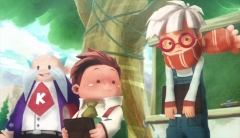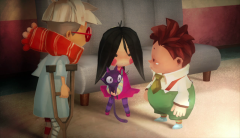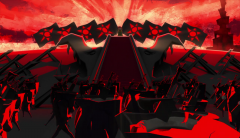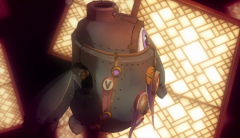This episode is one of the reason why I am glad that I’m still putting my faith on 18if, an episode that displays a complete different range of visual style, and a satisfying children’s story about friendship as a cherry on top. There’s a lot to love here, from the beautiful aesthetic that heavily influenced by the European stop-motion-like (it’s still hand-drawn though) animation, to the tale that inspired by children fairytale with more mature, political undertones and the song “And there were none” at the end nearly take my breath away. This freedom of creating wide range of visual-storytelling based on each directors’ own visions is 18if’s most appealing factor, and episode 7 is when that freedom works totally for the show’s benefits. This comes as no surprise that the director handling 18if this week is veteran Kouichi Chigita, a director who responsible for Last Exile; Brave Story and Full Metal Panic. Apart from a bit of obvious, shaky CG opening, the rest of the episode moves with ease with the stunning visual that pays homage to many other Western animations, but nonetheless is original enough to stand on its own.
I’m not attempting to discuss about the actual plot of this beautiful episode (ala what all this means in the real life), as I believe the dreamy story we witnessed makes sense enough that trying to dig deeper into the plot kinda do its story a huge disservice. Instead, I will delve into the literacy inspirations this episode makes references from. The most obvious comparison would be The Little Prince, both because of those similar styles, but also they share the same kind of fairytale story and the same mature feeling those two manage to pull. Well, the main character, Pol, is a prince if there’s any more doubt. The character designs are decidedly simple that are reminiscent of stop-motion puppets and a fair bit remind me of Pixar’s characters of all things. The art designs are another highlight as 18if produces an enormous amount of standout backgrounds, from the peaceful forest, to the doomed city life to the creative kingdom designs. At one time the show reminds me greatly of Samurai Jack as you can see in one of the screenshots, and at other time the character designs, especially those who manipulated Pol, take a nod towards those villains in the Triplets of Belleville and our mains this week are another nod to the characters from the Wizard of Oz. Like I said, while this episode has huge inspirations, never at once I feel it as a rip-off, because those influences are in service of deepening its narrative and manage to bring the emotions across.
Then, the characters of Pol and Pot are heavily implied as a reference to Polpot, the infamous Khmer dictator and the Khmer Rouge and the even more infamous The Killing Fields. The way Pol eventually abandons his friendship, becomes heartless in the process and rules the Kingdom of massacre of innocent people, people died from hunger, totalitarian rules and the way he was just a puppet figure head all have very dark political undertones pointed towards that dark period of Cambodia. It’s also implied that Pot, his best friend, is executed for the crime of “treason”, the same crimes that the Khmer Rouge would use to kill intellectual people (more commonly known as “people with glasses”).
But all the metaphors and references are just a mere service to tell a story about a friendship between Pol (the Prince), his best friend Pot and the girl Nene, whom later become a Witch. And I would recommend you not to look so much into the deeper metaphors because the story is beautiful as it is, while at the same time tell us just enough about the Witch’s issues. It’s a rather tough trick to pull considering that the whole episode is from Pol’s (not the Witch’s) perspective; but we can really understand what make Nene drifting apart and come to hate the friendship that she used to love. The story literally goes all the phases of emotional progressions (the Five Passions: joy; pleasure, grief, anger, hate), while paralleling all the phases of their friendship from how the friendship is formed, how it comes to a genuine love and how everything just broken apart afterwards; how Pol comes to term with accepting the fault he made and how eventually Nene comes to forgive him about his misdeeds. It’s a story about growing up, all told in a form of dreamy fairytale that might not appear to make sense on the surface, but make total sense narratively.
Well, I’m intrigued to see what 18if will go from here. This episode alone receives a perfect 5/5 score from me and I’m not pressing to say that this episode is my favorite standalone episode of this season. As in the nature of 18if, this episode is a standalone story so everyone can watch it and see the stunning, simple yet elegant little story for yourself. Sometimes it’s nice to see something like this in an anime-landscape, which remind me again of the possibilities and the globalization anime medium is capable of.





Looks like I need to pick this show back up.
You just need to watch this one. Other episodes bring different styles, sure, but most of them have been meh so far.